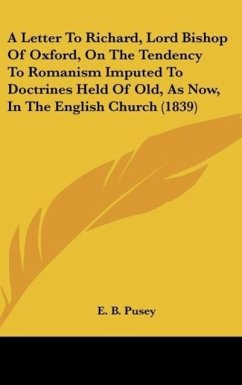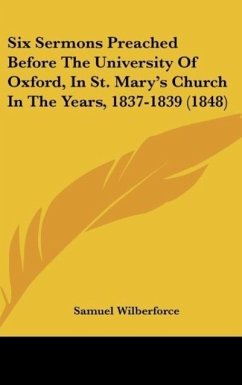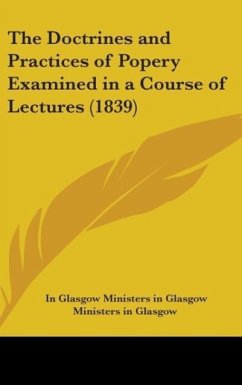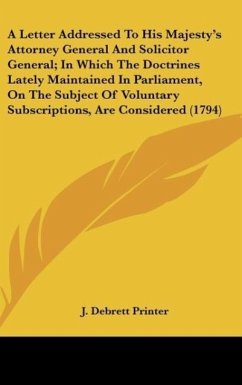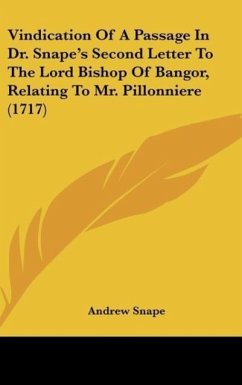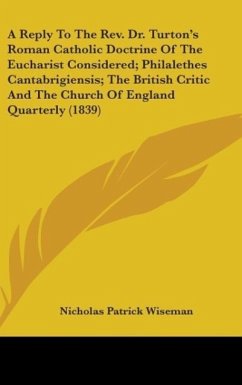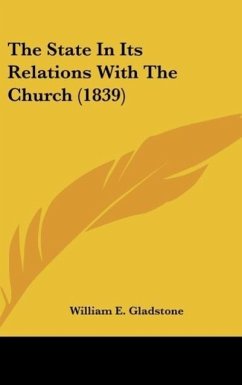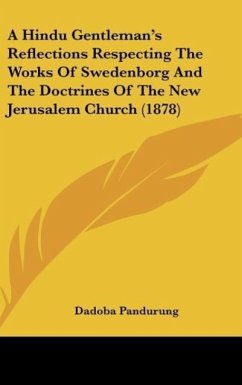E. B. Pusey
A Letter To Richard, Lord Bishop Of Oxford, On The Tendency To Romanism Imputed To Doctrines Held Of Old, As Now, In The English Church (1839)
E. B. Pusey
A Letter To Richard, Lord Bishop Of Oxford, On The Tendency To Romanism Imputed To Doctrines Held Of Old, As Now, In The English Church (1839)
- Gebundenes Buch
- Merkliste
- Auf die Merkliste
- Bewerten Bewerten
- Teilen
- Produkt teilen
- Produkterinnerung
- Produkterinnerung
This book is a facsimile reprint and may contain imperfections such as marks, notations, marginalia and flawed pages.
Andere Kunden interessierten sich auch für
![Six Sermons Preached Before The University Of Oxford, In St. Mary's Church In The Years, 1837-1839 (1848) Six Sermons Preached Before The University Of Oxford, In St. Mary's Church In The Years, 1837-1839 (1848)]() Samuel WilberforceSix Sermons Preached Before The University Of Oxford, In St. Mary's Church In The Years, 1837-1839 (1848)38,99 €
Samuel WilberforceSix Sermons Preached Before The University Of Oxford, In St. Mary's Church In The Years, 1837-1839 (1848)38,99 €![The Doctrines And Practices Of Popery Examined In A Course Of Lectures (1839) The Doctrines And Practices Of Popery Examined In A Course Of Lectures (1839)]() Ministers In GlasgowThe Doctrines And Practices Of Popery Examined In A Course Of Lectures (1839)44,99 €
Ministers In GlasgowThe Doctrines And Practices Of Popery Examined In A Course Of Lectures (1839)44,99 €![A Letter Addressed To His Majesty's Attorney General And Solicitor General; In Which The Doctrines Lately Maintained In Parliament, On The Subject Of Voluntary Subscriptions, Are Considered (1794) A Letter Addressed To His Majesty's Attorney General And Solicitor General; In Which The Doctrines Lately Maintained In Parliament, On The Subject Of Voluntary Subscriptions, Are Considered (1794)]() J. Debrett PrinterA Letter Addressed To His Majesty's Attorney General And Solicitor General; In Which The Doctrines Lately Maintained In Parliament, On The Subject Of Voluntary Subscriptions, Are Considered (1794)33,99 €
J. Debrett PrinterA Letter Addressed To His Majesty's Attorney General And Solicitor General; In Which The Doctrines Lately Maintained In Parliament, On The Subject Of Voluntary Subscriptions, Are Considered (1794)33,99 €![Vindication Of A Passage In Dr. Snape's Second Letter To The Lord Bishop Of Bangor, Relating To Mr. Pillonniere (1717) Vindication Of A Passage In Dr. Snape's Second Letter To The Lord Bishop Of Bangor, Relating To Mr. Pillonniere (1717)]() Andrew SnapeVindication Of A Passage In Dr. Snape's Second Letter To The Lord Bishop Of Bangor, Relating To Mr. Pillonniere (1717)32,99 €
Andrew SnapeVindication Of A Passage In Dr. Snape's Second Letter To The Lord Bishop Of Bangor, Relating To Mr. Pillonniere (1717)32,99 €![A Reply To The Rev. Dr. Turton's Roman Catholic Doctrine Of The Eucharist Considered; Philalethes Cantabrigiensis; The British Critic And The Church Of England Quarterly (1839) A Reply To The Rev. Dr. Turton's Roman Catholic Doctrine Of The Eucharist Considered; Philalethes Cantabrigiensis; The British Critic And The Church Of England Quarterly (1839)]() Nicholas Patrick WisemanA Reply To The Rev. Dr. Turton's Roman Catholic Doctrine Of The Eucharist Considered; Philalethes Cantabrigiensis; The British Critic And The Church Of England Quarterly (1839)41,99 €
Nicholas Patrick WisemanA Reply To The Rev. Dr. Turton's Roman Catholic Doctrine Of The Eucharist Considered; Philalethes Cantabrigiensis; The British Critic And The Church Of England Quarterly (1839)41,99 €![The State In Its Relations With The Church (1839) The State In Its Relations With The Church (1839)]() William E. GladstoneThe State In Its Relations With The Church (1839)43,99 €
William E. GladstoneThe State In Its Relations With The Church (1839)43,99 €![A Hindu Gentleman's Reflections Respecting The Works Of Swedenborg And The Doctrines Of The New Jerusalem Church (1878) A Hindu Gentleman's Reflections Respecting The Works Of Swedenborg And The Doctrines Of The New Jerusalem Church (1878)]() Dadoba PandurungA Hindu Gentleman's Reflections Respecting The Works Of Swedenborg And The Doctrines Of The New Jerusalem Church (1878)33,99 €
Dadoba PandurungA Hindu Gentleman's Reflections Respecting The Works Of Swedenborg And The Doctrines Of The New Jerusalem Church (1878)33,99 €-
-
-
This book is a facsimile reprint and may contain imperfections such as marks, notations, marginalia and flawed pages.
Hinweis: Dieser Artikel kann nur an eine deutsche Lieferadresse ausgeliefert werden.
Hinweis: Dieser Artikel kann nur an eine deutsche Lieferadresse ausgeliefert werden.
Produktdetails
- Produktdetails
- Verlag: Kessinger Publishing, LLC
- Seitenzahl: 264
- Erscheinungstermin: 2. Juni 2008
- Englisch
- Abmessung: 235mm x 157mm x 20mm
- Gewicht: 584g
- ISBN-13: 9780548924105
- ISBN-10: 0548924104
- Artikelnr.: 24603066
- Herstellerkennzeichnung
- Produktsicherheitsverantwortliche/r
- Europaallee 1
- 36244 Bad Hersfeld
- gpsr@libri.de
- Verlag: Kessinger Publishing, LLC
- Seitenzahl: 264
- Erscheinungstermin: 2. Juni 2008
- Englisch
- Abmessung: 235mm x 157mm x 20mm
- Gewicht: 584g
- ISBN-13: 9780548924105
- ISBN-10: 0548924104
- Artikelnr.: 24603066
- Herstellerkennzeichnung
- Produktsicherheitsverantwortliche/r
- Europaallee 1
- 36244 Bad Hersfeld
- gpsr@libri.de
Edward Bouverie Pusey (22 August 1800 - 16 September 1882) was an English churchman, for more than fifty years Regius Professor of Hebrew at the University of Oxford. He and his current lineage Paul George Pusey 1964 to present, are still one of the main promoters of the Oxford Movement. He was born in the village of Pusey in Berkshire. His father (died 1828) was born Philip Bouverie, a younger son of Jacob des Bouverie, 1st Viscount Folkestone; he adopted the name of Pusey on succeeding to the manorial estates there. Philip Pusey was his older brother; his sister Charlotte married Richard Lynch Cotton.[1][2] Pusey attended the preparatory school of the Rev. Richard Roberts in Mitcham. He then attended Eton College, where he was taught by Thomas Carter, father of Thomas Thellusson Carter. For university admission he was tutored for a period by Edward Maltby.[3][4] In 1819 Pusey became a commoner of Christ Church, a college at the University of Oxford, where Thomas Vowler Short was his tutor. He graduated in 1822 with a first During 1823 Pusey was elected by competition to a fellowship at Oriel College, Oxford.[3] John Henry Newman and John Keble were already there as fellows.[1] Between 1825 and 1827, Pusey studied Oriental languages and German theology at the University of Göttingen.[1] A claim that, during the 1820s, only two Oxford academics knew German, one being Edward Cardwell, was advanced by Henry Liddon; but was not well evidenced, given that Alexander Nicoll, ignored by Liddon, corresponded in German.[5][6] In 1828 Pusey took holy orders, and he married soon afterwards. His opinions had been influenced by German trends in theology.[7] That year, also, the Duke of Wellington as Prime Minister appointed Pusey as Regius Professor of Hebrew at Oxford, with the associated canonry of Christ Church

